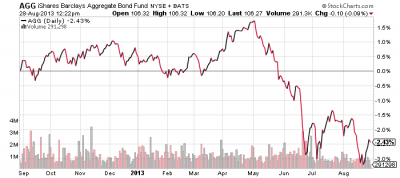It seems like everyone’s talking about the great bond market “slaughter” of 2013. Yeah, it’s been brutal, but not really. If you’ve been invested in long US government bonds then you’ve been dragged out back and beaten up pretty good. Other than that, the aggregate bond market really hasn’t done much of anything in 2013. The iShares Aggregate Bond Index is down about -2.5%. So, are we really screaming out of every Wall Street window over TWO POINT FIVE PERCENT?
Let’s all take a deep breath and step back from the ledges here. Let’s try to actually put things in perspective because I am worried that some Wall Streeters are up to their usual tricks of misreporting how things should be benchmarked and overdramatizing things so they can generate some much needed fear driven attention.
First of all, we use the aggregate index to track the WHOLE bond market because anything else is a version of cherry picking. Just like you wouldn’t say “stocks are getting slaughtered” just because tech stocks fell a lot. No, you would look at the broad index of stocks and if the index is getting slaughtered then it’s fine to say “stocks are getting slaughtered”.
So, here’s the iShares Bond Aggregate (formerly known as the Lehman Bros Aggregate – now, Lehman bros, there’s a “slaughter”) on a one year basis and the brutal 2.5% decline:
Yes, it’s true. Parts of the bond market have been pretty beat-up. The long bond is down 10-15% depending on your duration. But that’s a slice of the overall bond market. When we back up and take the big picture view it becomes pretty clear that the bond “slaughter” hasn’t really been anything close to a slaughter, but more like another thing that the media and Wall Street has made a big deal of for no good reason.
Mr. Roche is the Founder and Chief Investment Officer of Discipline Funds.Discipline Funds is a low fee financial advisory firm with a focus on helping people be more disciplined with their finances.
He is also the author of Pragmatic Capitalism: What Every Investor Needs to Understand About Money and Finance, Understanding the Modern Monetary System and Understanding Modern Portfolio Construction.



Comments are closed.